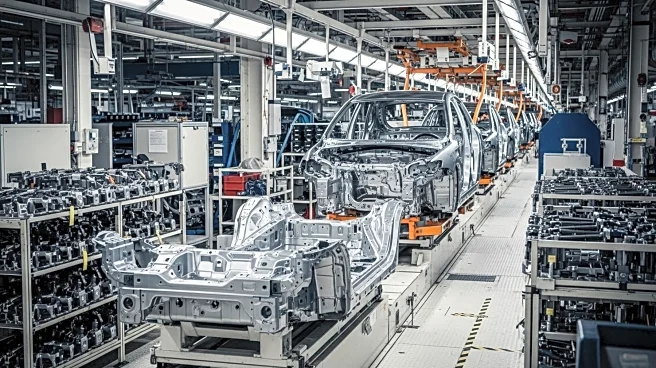What's Happening?
The South African automotive industry is focusing on the importance of completely knocked-down manufacturing, a process where vehicles are built from the ground up using locally manufactured components. This approach contrasts with semi knocked-down assembly, which involves importing vehicle bodies and components for local assembly. The industry, particularly in the Eastern Cape, relies heavily on this manufacturing method, which supports substantial job creation and economic stability. The sector contributes significantly to the South African economy, accounting for 21.9% of domestic manufacturing output and 5.3% of GDP. It sustains approximately 115,000 direct jobs and up to a million indirect jobs through its extensive value chain.
Why It's Important?
Completely knocked-down manufacturing is crucial for South Africa's economic stability and job creation. It supports local component manufacturers, contributing to a robust industrial base and high employment levels. The method requires significant investment, ranging from R3-billion to R11-billion for new plants, compared to the minimal investment needed for semi knocked-down assembly. This investment fosters technology transfer, skills development, and local supply chain localization. The automotive sector's reliance on this manufacturing process is vital for maintaining its position as the largest manufacturing sub-sector in the country, ensuring sustainable economic growth and employment.
What's Next?
The South African government is urged to implement policies that favor completely knocked-down manufacturing to protect local jobs and industries. Discussions with China and India are ongoing to transition their operations to this manufacturing method. The government needs to act swiftly to reshape industrial policy, ensuring incoming investments align with South Africa's economic interests. Business and labor organizations are advocating for these changes, emphasizing the need for decisive government action to support local manufacturing and prevent deindustrialization.
Beyond the Headlines
The shift towards completely knocked-down manufacturing has broader implications for South Africa's industrial policy and economic strategy. It highlights the need for government intervention to curb cheap imports and support local industries. The approach also underscores the importance of collaboration between business and government to address infrastructure and logistical challenges that impact competitiveness. Ensuring high local content levels in manufacturing is essential for sustaining the ecosystem of component suppliers and maximizing economic impact.









